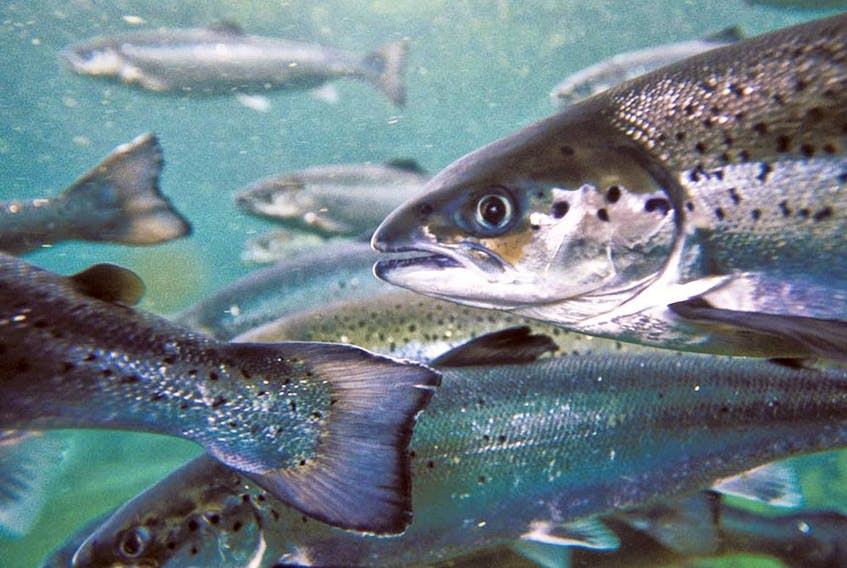ST. JOHN'S, N.L. — A massive salmon die-off on Newfoundland’s south coast has led to the suspension of licences for Northern Harvest Sea Farms in Newfoundland and Labrador.
The die-off first occurred on Sept. 3, but information about the incident did not go public until weeks later.
No estimate for the amount of dead salmon in the Northern Harvest pens were disclosed until Friday, when the company announced 2.6 million salmon had died.
“As a result of the ongoing investigation and evidence of non-compliance, I am suspending all affected Northern Harvest Seafood Farms licences and issuing a directive that requires the company to continue the cleanup of the sites,” Fisheries and Land Resources Minister Gerry Byrne said in a statement.
“I will be amending licence conditions to all unaffected Northern Harvest Seafood Farms and other associated MOWI licence sites in the coming days.”
As of Friday, the company was not made aware of what needed to be done for its licences to be reinstated. Northern Harvest communications director Jason Card says the government is drafting a letter detailing what is needed.
“Surprised by the suspension? Yes. Warranted? I think the minister has an obligation to protect the public good, so he’s doing what he thinks is best,” Northern Harvest managing director Jamie Gaskill said.
An initial number provided to the government was that two million fish had died, but after an addition 600,000 fish were found dead, the company updated the figure, triggering the suspension of the licence.
The massive death was not accompanied by a massive escape of farmed salmon, Gaskill said.
“There are no fish that have escaped. I am very confident,” he said.
Provincial regulations dictate that companies must report the escape of even a single fish, and no such reports have yet been issued.
The 2.6 million salmon carcasses will be delivered to another company to be processed and turned largely into cat food and other animal feed.
The company says sustained southwestern winds in the area of the farm caused increased temperatures near the sea farms housing the salmon. The company says the surface water near the pens warmed up and maintained an increased temperature over the course of weeks.
Because water near the surface was warmer than water further below, Gaskill said, the salmon followed their instinct, toward their demise.
“These fish want to go where it’s good for them. So, what they do, they nose down — it’s called sounding. Anybody that is familiar with herring, mackerel, lots of fish do this,” he said.
“They put their nose down, they try to get down to where it’s cool, where conditions are better, and they smother themselves.”
As for why information was slow getting to the public, Gaskill said his company “misinterpreted” the reporting requirements for the second mass die-off of salmon.
“That is our fault,” he said.
Card says information about the mass die-off was reported locally, but not to the public.
“To be clear, we did disclose to local stakeholders, mayors, indigenous first leaders, the FFAW, to our own staff when we observed this event, that it happened. To be clear, we also disclosed to government that we had a mass mortality on September 3.”
According to the Department of Fisheries and Land Resources, new regulations were implemented on Thursday, enshrining for the first time a duty to publicly report mass deaths of farmed salmon.
Regulations wanting
Large deaths of farmed salmon are not rare within the aquaculture industry throughout the world.
According to the Ferret, a Scottish investigative news outlet, nine million farmed salmon have died in that country since 2016, between 760 reported mass deaths in the country. The mass salmon die-off in this province hit almost a third of that number in one incident.
Michael Montague, a specialist with the Scottish Environmental Protection Agency (SEPA), says there are three separate entities that oversee differing aspects of the industry in that country.
SEPA oversees the concentration of fish in aquaculture pens and effluent coming from aquaculture projects, and determines how much chemicals and antibiotics are allowed to be used at any given time. SEPA has monthly monitoring programs for companies to comply with as part of their regulations.
“We don’t really look at the mortality aspect. The mortality aspect is covered by two legislative parts. There’s the Marine Scotland … they are very much focused on fish health. If there’s a certain percentage of fish lost, then they have to report that through Marine Scotland,” said Montague.
“Then, there’s also the Animal and Plant Health Agency. They have the regulations covered by animal byproducts regulations, and that looks at any kind of waste, from cattle to marine caged fish farms. They deal with those kinds of (mass death) incidents and how to deal with the waste coming from them and any concerns around that.”
In Newfoundland and Labrador, the aquaculture industry is largely regulated by the Department of Fisheries and Land Resources and the federal Department of Fisheries and Oceans (DFO). DFO declined an interview request from The Telegram.
Enforcement measures at the government’s disposal, according to the Department of Fisheries and Land Resources, include a formal warning, followed by tickets ranging between $100 and $500, administrative penalties. Those charged with an offence under the act will be charged between $5,000 and $20,000 for a first offence and/or face one to six months in prison for a second offence, and up to a $50,000 to $100,000 fine and/or three to six months in prison for third-time offenders.
The Department of Fisheries and Oceans is expected to make a statement Tuesday about the incident.









